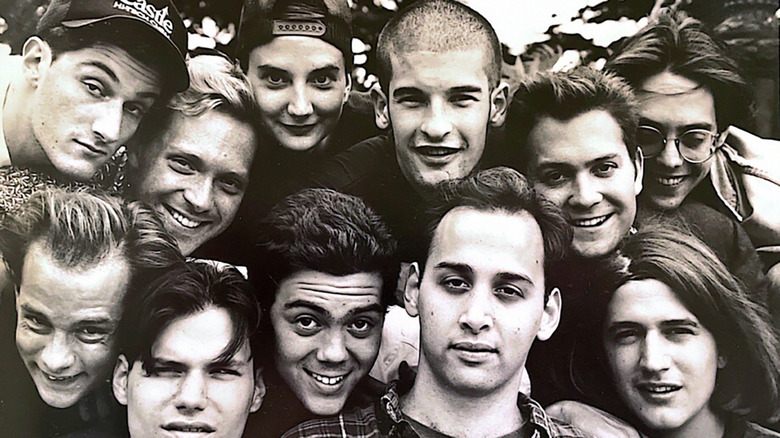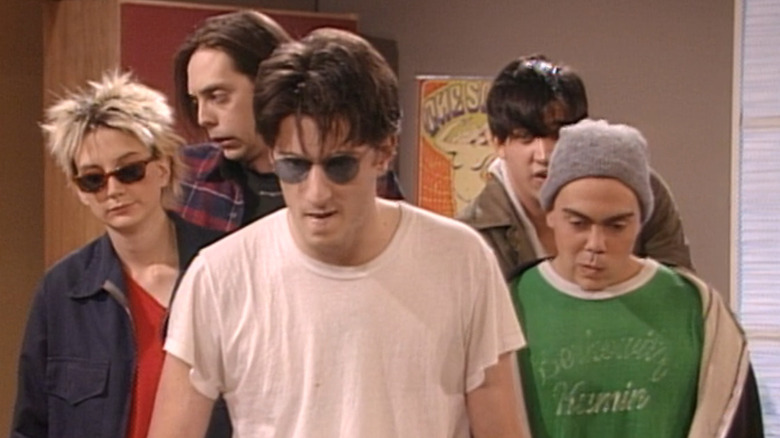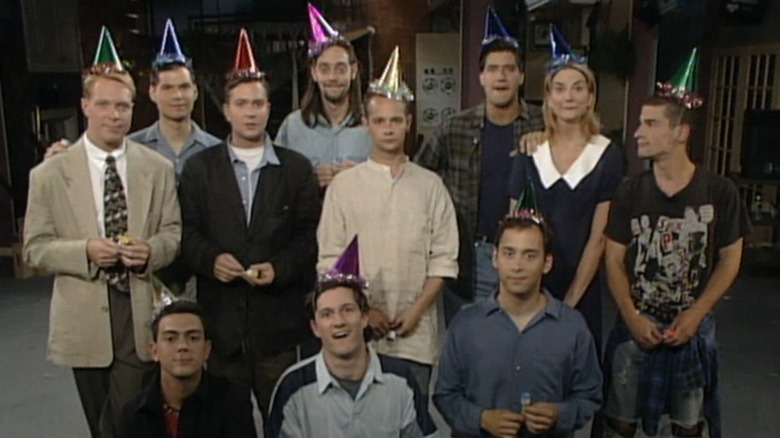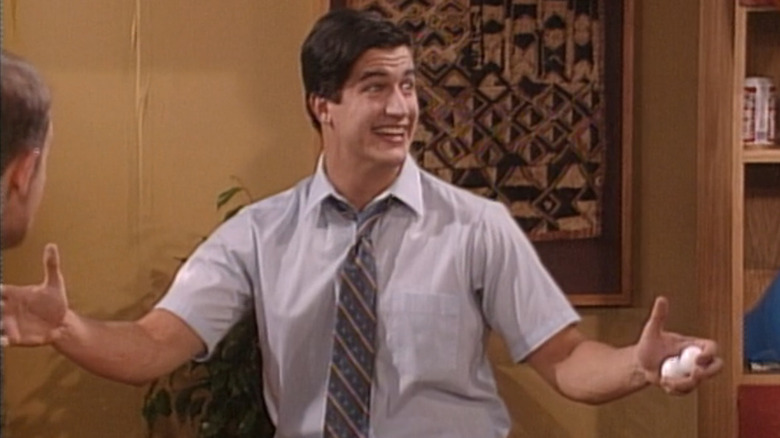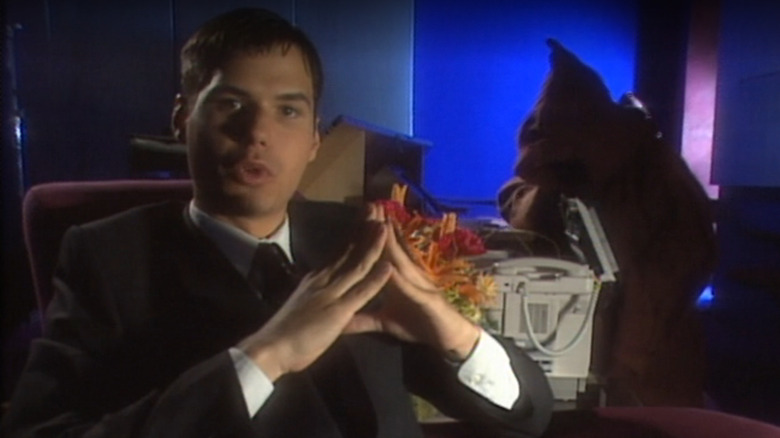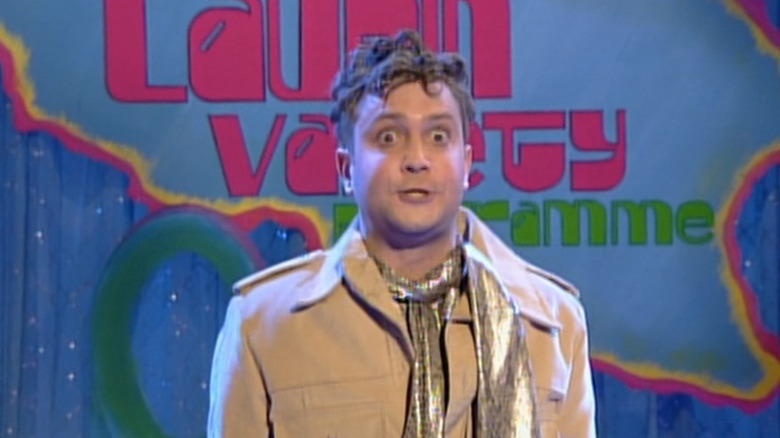Why MTV's The State Ended And Created A Rift Between The Alternative Sketch Comedy Group
Back in the 1990s, sketch comedy was mostly dominated by "Saturday Night Live." After a rough patch in the 1980s, the series rose to prominence again thanks to the talents of "Wayne's World" stars Mike Myers and Dana Carvey, Chris Farley, Adam Sandler, Will Ferrell, Cheri Oteri, Molly Shannon, and more. But during this time, there were also a series of worthy, alternative sketch comedy competitors that offered a nice change of pace from the mainstream network laughs of "SNL."
From the delightfully Canadian comedy of "Kids in the Hall," to the diverse hilarity of "In Living Color," the short-lived but brilliant "The Dana Carvey Show," to the madness of "Upright Citizens Brigade," there was a sketch comedy show for everyone. But perhaps the series that would go on to have the biggest impact in pop culture's future was MTV's "The State," named after the comedy troupe of the same name.
Comprised of 11 up and coming comedians — Kevin Allison, Michael Ian Black, Robert Ben Garant, Todd Holoubek, Michael Patrick Jann, Kerri Kenney-Silver, Thomas Lennon, Joe Lo Truglio, Ken Marino, Michael Showalter, and David Wain — almost all of whom would go on to bigger endeavors in film and television, The State created and starred in a pre-taped sketch comedy series that ventured into much stranger and more oddball humor than "SNL" often did during the '90s. While "SNL" leaned into recurring characters with prominent catchphrases and schticks, "The State" mocked them with characters like Ken Marino's Louie, a guy who constantly gets jazzed about dipping his balls in things, or the good-natured stereotypical characters The Jew, the Italian, and the Redhead Gay, introduced after The State announced their intention to "avoid stereotyping of any kind."
Though they initially got off to a shaky start with harsh reviews, "The State" eventually found its place in the sun and became a low-key comedy juggernaut across just four short seasons. In fact, they would have stuck around a bit longer, but as the new documentary "Long Live The State" revealed in its premiere at the Tribeca Film Festival this month, the ugly head of show business and a growing rift between the troupe would eventually tear it all down.
Let's take a look at why "The State" came to an end and how the group's members became at odds with each other for some time.
Where did The State come from?
"Long Live The State" premiered at Tribeca on June 9, though it currently doesn't have distribution. Hopefully that will change soon, as it simply but thoroughly digs into the origins of "The State," succinctly chronicling the group's rise and fall, which was thankfully followed by the rise of nearly all of its individual parts, each of which gets their time in the sun during the film's 110-minute runtime. It's an informative look back at this piece of comedy history, and for fans of "The State," it's an honest profile of a group of friends who were just trying to make something hilarious that they can be proud of. For those less familiar, it should be an eye-opening chronicle of one of the great sketch comedy shows of the '90s.
First known as "The New Group," which was created in their college years at New York University, the members of The State cut their teeth on the MTV sketch comedy series "You Wrote It, You Watch It," a predecessor to YouTube of sorts that was hosted by none other than comedian Jon Stewart for just one season from 1992 to 1993. They would go on to get their own series in 1994, which is when they officially started calling themselves The State, a name which was picked by Michael Patrick Jann out of a newspaper, after a list of dozens of silly options didn't appeal to them, some of which included "Mom's Sample Pie," "The Green Beans Group," and "Medium Head Root," which Ken Marino loved for some reason.
Despite unkind reviews, including a negative two-star review from The New York Post and being called "so terrible it deserves to be studied" by The Daily News (as quoted in a hilarious self-deprecating promo created by The State themselves, seen above), thankfully, The State realized that they were punk rock comedy, and the criticism they were experiencing wasn't dissimilar from the hate that was being thrown at MTV in general by fuddy-duddy folks who thought it would destroy the youth of America. Basically, the times, they were a-changin”, and The State's time to shine was just around the corner.
Success came, but so did creative differences and a rift between The State
That commercial promo leaning into those bad reviews ended up being one of the best things they could have done, and from there, "The State" became the talk of the town. But with success, also comes struggle. As the profile of "The State" grew, so did tensions among the group.
As Michael Ian Black recalls in the film, "The one thing that I was very conscious of, I don't know why, but I just knew that this was the case: Failure wasn't gonna be a problem for us, but success would be. I just knew right away, success, if we had it, was gonna cause a lot of fissures, because the voices in that group were just too strong."
Amidst the success of "The State," a rift began to grow between them. As Robert Ben Garant explains:
"There were two camps, for sure. There were the people who liked Jann and the people who liked David. And we didn't hate the other group, but there were two camps for sure. It was different senses of humor. Jann and Tom and me were in this hard joke, slapstick, end with the big laugh camp. David, in that camp, liked anti-humor and word jazz is what we very dismissively called it. People f*****g love it, and I like David, [but] I don't get it."
"By the time we were doing our fourth season, we had really kind of found our stride, and we had a lot of confidence in what we were doing, but those fissures were starting to emerge in the group," said Black. "It was a lot more frustration with each other, a lot more arguing, a lot more tension. Personally, I was feeling kind of burnt out and exhausted, and depressed."
That tension and rift would become even bigger when a major opportunity to bring "The State" to a larger audience completely fell apart.
The State got a chance at network television to compete with SNL
Despite that mounting tension, Kevin Allison said that the group was still feeling confident that they could be even bigger, noting, "After 28 or so episodes at MTV, we felt like, couldn't we be in the big leagues? What if we went up against 'Saturday Night Live'?"
It sounds like the enthusiasm was there from everybody, despite the growing creative clash. Black recalled, "When the opportunity sort of presented itself, that hey, maybe we could jump to a network, ABC, it was like, this feels right."
Lo Truglio thought it would help them evolve, explaining, "I was always for making that jump, and I just felt like the group needed a different challenge. Maybe that was my own perception of it, but in order for the group to get better, we needed to open up and broaden out. For me, it was always a no-brainer."
Showalter, who has gone on to direct movies like "The Idea of You," was also fully on board, "That was like, 'Holy s***.' We are going to have our own show in the same time slot as 'SNL.' And we were gonna actually get paid real money, and we were gonna have a bigger platform. It was gonna sort of validate everything."
So MTV's "The State" came to an end, and the group prepared to head over to ABC. So why did you never see The State get their own series on network television?
The network deal for The State totally crumbled
During the break between MTV's version of the show ending and the prospect of ABC's series coming to fruition, the deal fell apart, and it's not entirely clear why. Showalter laments, "It all fell apart. They couldn't get enough of the affiliate stations to wanna do it — I don't know. I have no clue."
Not only did they lose the ABC deal, but they also lost Todd Holoubek, who felt his voice in the group had been waning anyway. But as Lennon confirmed, "Todd quit, but Todd quit because we were all pushing him to quit so hard, because we were being psychos."
CBS jumped into the equation as a new home for "The State" to get their network shot, but as Allison pointed out, "CBS was like the worst place to be at that time, because it was the older folks sort of network." Black echoes those sentiments by noting, "The average age of that audience was probably somewhere in the mid-80s," which isn't the best place for a punk rock sketch comedy show that found success at MTV, the channel that many CBS audience members openly hated.
Jann recalls that CBS encouraged their arrival because they were hoping to change their whole brand and use "The State" as a way to bring in that revolution. But even The State's entertainment reps encouraged them not to leave MTV for CBS.
But they tried anyway. Before going head-to-head with "SNL" in the fall of 1996, the deal indicated that The State would do a series of holiday specials in 1995, starting with a Halloween special that aired on October 27. The show received fanfare from critics, including a four-star review from Michele Greppi of the New York Post, the same critic who originally panned their MTV debut, who wrote, "That was then, this is wow."
Unfortunately, the Halloween special ratings were abysmal, largely due to a lack of promotion, and CBS chose to cancel the next planned New Year's special, and their hopes for a proper series on CBS were dashed entirely. Looking back on the attempted shift, Wain says, "We probably would have had a longer, more solidified run at MTV than having the one special on CBS that nobody watched."
Instead, this was the end of The State, though Black thinks they wouldn't have continued much longer if the CBS fallout hadn't occurred, "Us going to CBS probably hastened our demise, but probably not by that much."
That's probably why Black didn't waste too much time throwing a pity party and instead opted to capitalize on their success by creating a spin-off of "The State." Black recalled, "When the group stopped, I was immediately like, 'Okay, let's do something else.'"
Viva Variety tore the group apart
That something else was "Viva Variety," a Comedy Central spin-off series based on "The State" sketch "The Mr. and Former Mrs. Laupin Variety Program," starring Thomas Lennon as Meredith Laupin, Kerri Kenney-Silver as the former Mrs. (Agatha) Laupin, and Michael Ian Black as Johnny Blue Jeans. While the show also brought in Ben Garant (known for collaborating with Lennon as a screenwriter duo on movies like "Night at the Museum"), as well as guest spots for Lo Truglio and Allison, the rest of the group was more than nonplussed about the series.
In retrospect, Black doesn't feel great about how it all played out, but he notes, "I was being kind of mercenary. I was like, 'Look, this is a business. The group is now essentially over or on a very long hiatus. I have to do something else. We all have to.'"
Those who weren't involved with "Viva Variety" filed a lawsuit, believing that everyone equally owned the rights to those characters, since they originated on "The State," so each member outside of that show was given a check for $2,700. But that didn't take away the anger or the betrayal they felt at the same time. Meanwhile, Garant himself was also hurt by the lawsuit, and he admittedly didn't speak to some of his comedy compatriots for years.
Lennon recalls, "People were very, very upset. I was obviously the ringleader of that; it was based off a sketch I had written for the group. Everybody's like, 'F*** you, you killed The State.' For a while, I definitely was the person that sort of killed The State."
Though The State, both as a group and a TV series, came to an upsetting end, the group would eventually lick their wounds and come together in various ways. Whether it was the comedy trio "Stella" with Black, Showalter, and Wain,; their cult favorite camp comedy "Wet Hot American Summer" and their ensemble comedy series "Reno 911!" (both of which got streaming revivals), or any of the other myriad of films and TV shows that have united various members over the years.
More recently, The State had a live sketch comedy tour that reunited almost every member during the Hollywood strikes in 2024. Plenty of fans dipped their balls in it.
